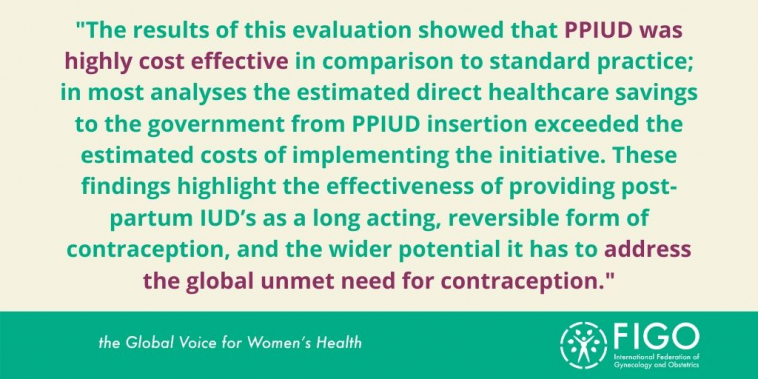PPIUD Project Economic Evaluation
Tanzania and Bangladesh are two of six countries where FIGO has been working to address high levels of unmet need for contraception, through the implementation of the Post-partum intrauterine device (PPIUD) initiative.
In both countries, active efforts are underway to increase facility delivery rates and the number of births at lower level facilities, making the antenatal period a key opportunity for increasing access to post-partum family planning services (PPFP).

The inclusion of PPIUD/PPFP services into national policy has been a long term goal for the initiative, and is in line with government commitments to SDG3.7 ‘By 2030, ensure universal access to sexual and reproductive health-care services, including for family planning, information and education, and the integration of reproductive health into national strategies and programmes’, making PPFP a key area of focus for sustainability as the initiative phases out in each country.
To advocate for future financing of immediate post-partum IUD services and to measure the cost effectiveness of our implementation in the two countries, the initiative has commissioned an economic evaluation. The results of this evaluation showed that PPIUD was highly cost effective in comparison to standard practice; in most analyses the estimated direct healthcare savings to the government from PPIUD insertion exceeded the estimated costs of implementing the initiative.
This means that more money was saved than was spent. These findings highlight the effectiveness of providing post-partum IUD’s as a long acting, reversible form of contraception, and the wider potential it has to address the global unmet need for contraception.
Assessment and results
The cost effectiveness of PPIUD service provision was assessed using three main outcomes: cost of PPIUD services, CYP (cost per couple of years of protection) and DALY (cost per daily adjusted life year). In Bangladesh the cost of direct service provision was USD $1.71 per PPIUD, cost per CYP was $14.60 and cost per DALY averted was $91.13. In Tanzania the estimated cost of direct service provision was $2.05 per PPIUD, cost per CYP was $54.57, and cost per DALY averted was $67.67. As part of the evaluation, data from Phase 2 of the initiative was analysed using the Marie Stopes Impact2 model. This tool estimates the likely real-world impact of our initiative.
Results showed that in Bangladesh, for the period analysed, FIGO’s provision of PPIUDs would have averted an estimated 16,683 unintended pregnancies, 63 child and 11 maternal deaths.
In Tanzania our services would have averted an estimated 15,471 unintended pregnancies, 306 child and 30 maternal deaths, helping these countries progress towards their SDG3 targets to reducing maternal mortality to 70 per 100,000 live births and neonatal mortality to at least as low as 12 per 1000 live births.
Cost and benefit projections of future service delivery
Further to this, cost and benefit projections of future service delivery on a national scale were estimated for both countries. In Bangladesh, the total cost of implementation across the country was estimated to be only $1.96 million, which was well below the total estimated savings of $2.6 million. The cost per DALY averted was $106.21 which was well below the GDP per capita of $1698 making it once again a highly cost-effective intervention.
In Tanzania, the total cost of implementation across the country was estimated to be $6.9 million which was well below the total estimated savings of $7.9 million. The cost per DALY averted was $43.31 which was significantly lower than GDP per capita of $1051 making it also a highly cost-effective intervention.
Call to action
This evaluation has produced vital evidence backing increased investment in PPFP. The results provide a compelling case for further investment in quality family planning counseling services during antenatal care and for the routine inclusion of PPIUD as a method of postpartum contraception.
FIGO PPIUD initiative would like to credit and thank Gillian Eva, Judy Gold and A/Prof Kim Dalziel and the country teams for their work on this economic evaluation. Please click here for a full version of the economic evaluation report ‘Evaluation of the FIGO Postpartum IUD Initiative in Bangladesh and Tanzania’.